Related Research Articles
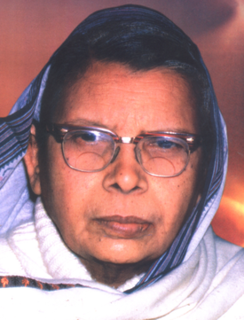
Mahadevi Varma was an Indian Hindi-language poet, essayist, sketch story writer and an eminent personality of Hindi literature. She is considered one of the four major pillars of the Chhayawadi era in Hindi literature. She has been also addressed as the Modern Meera. Poet Nirala had once called her "Saraswati in the vast temple of Hindi Literature". Varma had witnessed India both before and after independence. She was one of those poets who worked for the wider society of India. Not only her poetry but also her social upliftment work and welfare development among women were also depicted deeply in her writings. These largely influenced not only the readers but also the critics especially through her novel Deepshikha.

Sachchidananda Hirananda Vatsyayan, popularly known by his nom de plumeAgyeya, was an Indian writer, poet, novelist, literary critic, journalist, translator and revolutionary in Hindi language. He pioneered modern trends in Hindi poetry, as well as in fiction, criticism and journalism. He is regarded as the pioneer of the Prayogavaad (experimentalism) movements in modern Hindi literature.

Gopinath Kaviraj was an Indian Sanskrit scholar, Indologist and philosopher. First appointed in 1914 a librarian, he was the Principal of Government Sanskrit College, Varanasi from 1923 to 1937. He was also the editor of the Sarasvati Bhavana Granthamala during that period.
Govind Mishra is an Indian novelist, who has written more than 53 books. He was also a civil servant with Indian Revenue Service (IRS) and retired as Chairperson, Central Board of Direct Taxes in 1997. Over the years, he has written 11 novels, 14 short story collections, five travelogues, five literary essays collection, a poem collection and 2 story books for children.
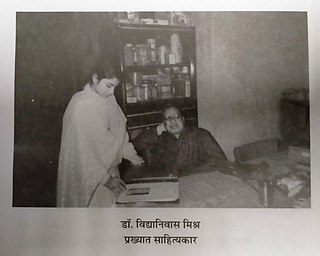
Vidya Niwas Mishra was an Indian scholar, a Hindi-Sanskrit littérateur, and a journalist. He was honoured with Padma Bhushan.
Govind Chandra Pande was a well-known Indian historian of the Vedic and the Buddhist periods. He served as professor of ancient history and vice-chancellor at Jaipur and Allahabad universities. He was also the chairman of the Indian Institute of Advanced Study, Simla for several years, the Chairman of Allahabad Museum Society and the Chairman of Central Tibetan Society, Sarnath Varanasi.

Satya Vrat Shastri was an Indian Sanskrit scholar, writer, grammarian and poet. He wrote three Mahakavyas, three Khandakavyas, one Prabandhakavyas and one Patrakavya and five works in critical writing in Sanskrit. His important works are Ramakirtimahakavyam, Brahattaram Bharatam, Sribodhisattvacharitam, Vaidika Vyakarana, Sarmanyadesah Sutram Vibhati, and "Discovery of Sanskrit Treasures" in seven volumes.

Bhagirath Prasad Tripathi, better known as Vagish Shastri, is an Indian Sanskrit grammarian, linguist, tantra and yogi. In 2018, Government of India awarded him the fourth highest civilian award Padma Shri for his work in the field of literature & education.
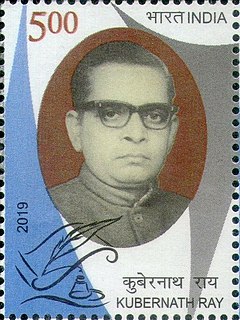
Kuber Nath Rai, also written as Kubernath Ray and Kuber Nath Ray, was a writer and scholar of Hindi literature and Sanskrit.
Kunwar Narain was a poet in Indian literature in Hindi. He read and traveled widely and wrote for six decades. He was linked to the New Poetry movement.
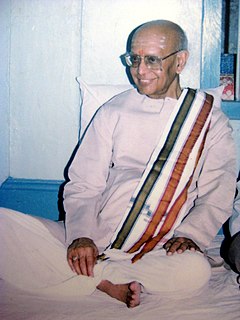
Vishwanathan Venkatachalam was an eminent Sanskrit scholar. He served as the vice-chancellor of Sampurnanand Sanskrit University, Varanasi, India for two terms. He was awarded the Padma Shri in 1989 by the Government of India for his valuable contribution to the field of Sanskrit research and education.
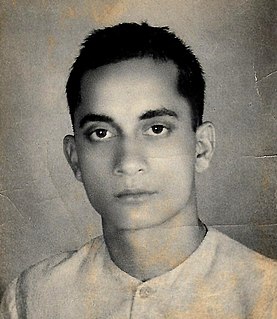
Rewa Prasad Dwivedi was a Sanskrit scholar, poet, writer, teacher, and critic. His original works include poetry as epics and lyrics, plays, and prose. He wrote new literature under the pseudonym "sanatana", meaning 'the eternal'. He is also known as 'Acharya' Dwivedi.
Dr. Prashasya Mitra Shastri is a Sanskrit poet and author who won the Sahitya Akademi Award for Sanskrit in 2009 for his Anabheepsitam, a collection of short stories. He also won the Kalidas Puraskar awarded by the Madhya Pradesh government's Kalidas Sanskrit Akademi. The award includes a letter of commendation and a cash prize of Rs 51000. He won the award for his contributions to Sanskrit literature and the two story collections and a collection of poetry he published in the year 2007–08. He has also won awards from the Sahitya Academies of Delhi, Rajasthan and Uttar Pradesh. He was the organiser for a three-day Rishi Balidaan Samaaroh in memory of Dayanand Saraswati in Ajmer in 2009. He is especially known for his light verse and stories featuring satire and irony.
Bhaskaracharya Tripathi,, is a Sanskrit poet who was the recipient of the 2003 Sahitya Akademi Award for Sanskrit for his work Nirjharini.
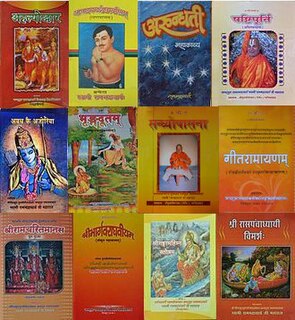
Jagadguru Rambhadracharya is a Hindu religious leader, Sanskrit scholar and Katha artist based in Chitrakoot, India. His works consist of poems, commentaries, plays and musical compositions of his works, etc. He has authored more than 100 books and 50 papers, including four epic poems, a Hindi commentary on Tulsidas' Ramcharitmanas, and Sanskrit commentaries on the Ashtadhyayi and the Prasthanatrayi scriptures. Various audio and video recordings o his works have also been released. He writes in Sanskrit, Hindi, Awadhi, Maithili, and several other languages.
Rahas Bihari Dwivedi is a Sanskrit scholar and poet from Jabalpur, Madhya Pradesh. He was awarded the President's Ceritificate of Honour for Sanskrit in the year 2012. He was the formerly the Head of the Department of Sanskrit at Rani Durgavati University, Jabalpur.
Kalika Prasad Shukla was a Sanskrit scholar and poet based in Varanasi, Uttar Pradesh. He won the Sahitya Akademi Award for Sanskrit in the year 1986 for the epic poem Śrīrādhācaritamahākāvyam. He was the Head of Departments of Vedanga and Vyākaraṇa at the Sampurnanand Sanskrit University.
Keshab Chandra Dash, is a scholar and author from Odisha.

Balram Shukla is an academician, poet and author based in New Delhi. He is a self-taught scholar of Sanskrit and Indian literature. He works as a professor of Sanskrit at the University of Delhi. He is a scholar of Sanskrit, Hindi, Urdu, Persian and Prakrit. He writes poetry in both Sanskrit and Persian, and also translates Persian poetry into Sanskrit using the same poetic metres. He has been awarded the Badrayan Vyas Award for Sanskrit in 2013 by the President of India. He has authored eight books.
Hardev Bahri was an Indian linguist, literary critic, and lexicographer of the 20th century, notable for his work in Hindi, Punjabi, and other related Indo-Aryan languages. He compiled numerous monolingual and bilingual dictionaries for both general and technical purposes in collaboration with the publisher Rajpal and Sons.
References
- ↑ "Gangopadhyay elected Sahitya Akademi president". The Hindu . 22 February 2008. Archived from the original on 26 February 2008.
- ↑ Report of 11th India Conference of Wider Association for Vedic Studies (WAVES), 2007.
- 1 2 "Propagate Sanskrit worldwide: scholar". The Tribune. India. 6 November 2001. Retrieved 17 June 2018.
- ↑ Sanskrit Studies Centre, Silpakorn University
- ↑ Kurukshetra University, Institute of Indic Studies (1972). Prāci-jyotī: digest of Indological studies. p. 286. Retrieved 14 December 2010.
- ↑ Annals of the Bhandarkar Oriental Research Institute, Volume 63